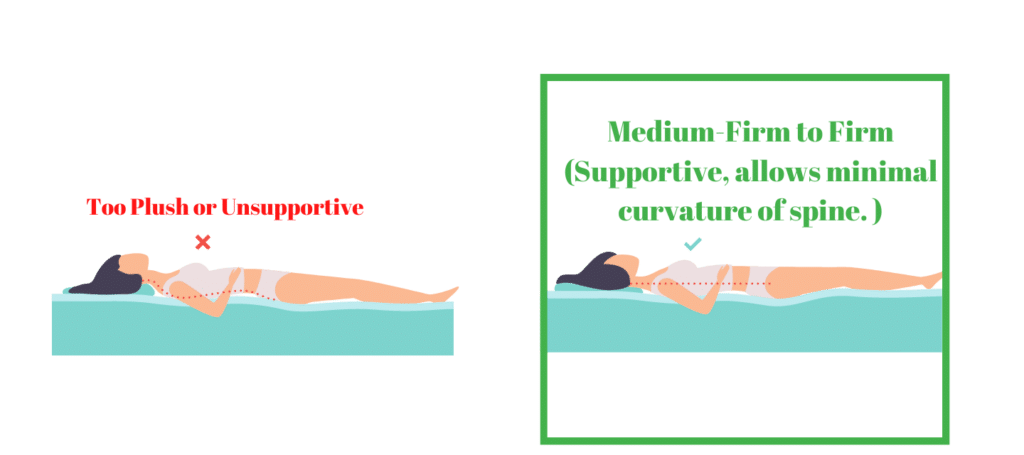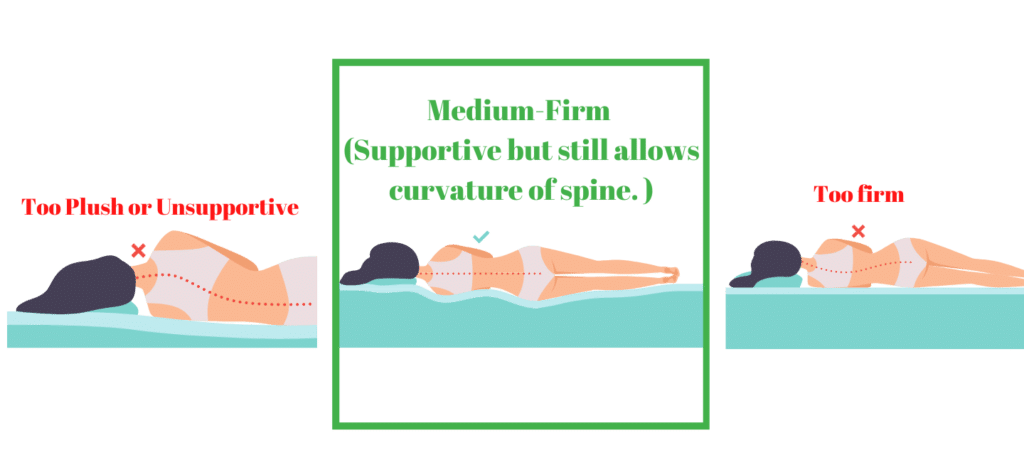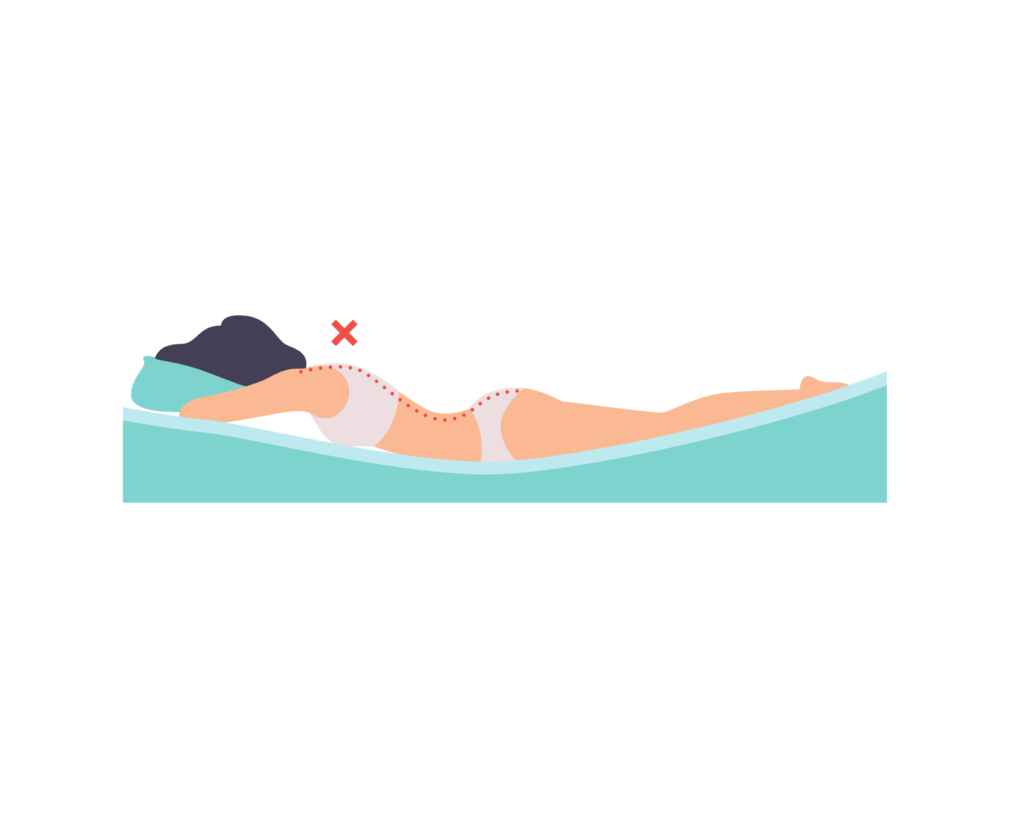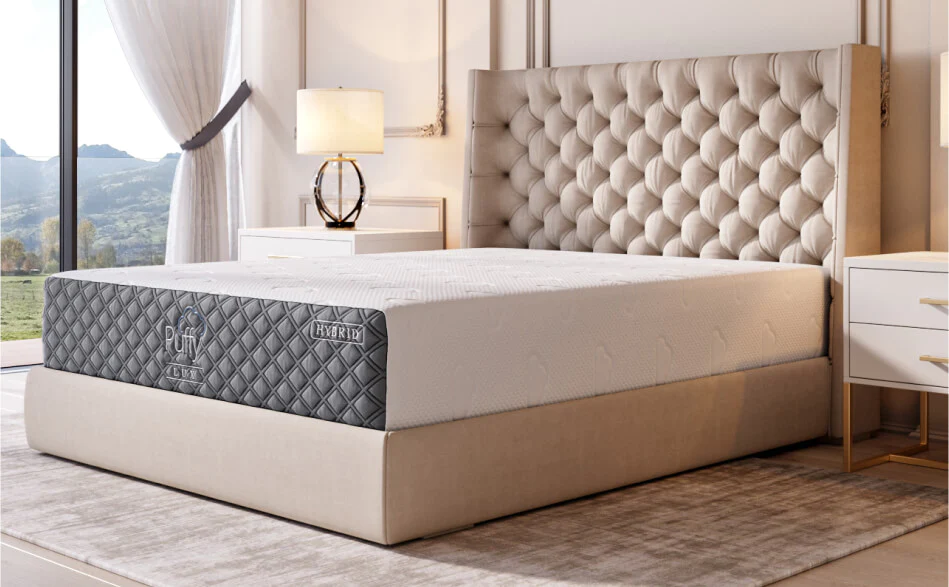Is Your Memory Foam Mattress Causing Back Pain? [Questions Answered]
Do you know what is causing your back pain? Could it be your memory foam mattress?

You have done all the steps. You have even gone as far as to purchase an extremely comfortable memory foam mattress to stop aches and pains. Could something like memory foam that should be contoured to your body, be causing or adding to your back pain? Or could it be something else?
In this article we will address if your memory foam mattress could be causing your back pain. And if it is, what is the solution? We will also look at some other causes of back pain and what you can do to relieve that pain. All while continuing to enjoy your memory foam mattress.
- Unbeatable value
- Heavy duty support from wrapped coil system
- Luxury pressure relief
- Removable and washable cover
- Made in the USA
Is Your Memory Foam Mattress Causing Back Pain?
At first glance, it may seem unlikely that your memory foam mattress could be causing back pain. The science behind these mattresses is that they form fit to your body. They contour along your body’s curves to give you the support and comfort you need. So, if all of that is true, how could your back hurt because of your memory foam mattress?
The answer is one size does not fit all. Not all memory foam mattresses are created equal. While the memory foam mattress is supposed to help relieve aches and pains, the wrong one can indeed cause them.
Cause #1: You Have The Wrong Memory Foam Mattress for Your Sleeping Style


Back pain can often be caused by the improper alignment of the spine while sleeping. For many, a memory foam mattress is the solution to this. It helps to contour your spine in a manner that keeps it aligned correctly and supported. In some cases, however, the mattress may contour to your spine incorrectly. That will cause back pain.
Having back pain that starts shortly after getting into bed and that eases throughout the day after getting out of bed, is a good sign your mattress is causing your back pain.
Memory foam mattresses can differ in many ways. Some are suited for side sleepers, while others will benefit someone who sleeps most comfortably on their back (we do not recommend sleeping on your stomach with back pain). Make sure you see the manufacturer recommendation for which sleeping style is recommended for which mattress. Different types of materials go into making the foam in each style of memory foam mattress. These materials can affect the way you sleep.
Different memory foam mattresses also have varying levels of firmness and elasticity. Purchasing one too soft may lead to your spine not being aligned correctly. The same can be said for one that is too firm. Again, proper spine alignment is key to preventing back pain. Make sure you read the manufacturer recommendations and reviews on the mattress to make sure the firmness meets your sleeping style.
Making sure you have the correct support with the box spring and/or bed frame getting used is also essential. If there is improper center support bars, broken supports or a misfit in size, this is going to cause lumps or sagging and affect the way you sleep. Putting a memory foam mattress on a bed frame that is too large or too small will also cause the mattress not to function and contour correctly.
Memory foam mattresses can cause back pain, but this can generally be prevented. The solution is to do your research before purchasing your mattress. Ensuring you get the correct mattress for your body type is crucial in preventing back pain. Figuring out your sleep style, body type, and other sleep needs can help you purchase the perfect memory foam mattress.
The technology behind the memory foam mattress is constantly evolving. If you experience back pain, a quality memory foam mattress will most often help with that pain. There has been a significant amount of research conducted on the subject. Many study results have concluded that a memory foam mattress is one of the best options for back pain sufferers.
Cause #2: Worn Out Memory Foam

Some may wonder if their back pain may be from their memory foam mattress because the pain is new, while the mattress is not. When you first purchased your mattress, you were getting the most comfortable sleep ever, but now you wake up in pain. Could that still be your memory foam mattress?
The short answer is yes.
As with many compounds, over time, the cellular structure of the memory foam will begin to break down (especially lower quality memory foam mattresses imported from Asia). It may become softer and unable to form into your body structure. Though you once had a mattress with a perfect firmness for you, that has broken down.
That means it cannot support you the way it was intended to, causing your spine to become misaligned and back pain to become prevalent.
A high-quality memory foam mattress gets designed to last approximately 10 to 15 years (when given the correct care and upkeep.) Signs that your mattress is worn out are
- Your body impression stays on the mattress long after you have gotten up.
- The impression that is left behind is 2 inches deep or more.
- The mattress is sagging or folding in.
- You are finding it difficult to get comfortable in bed.
- You wake up with back pain that eases after getting out of bed.
- If you have noticed these signs, there is a good chance it is time for a new memory foam mattress. If an old mattress is the cause of your sudden back pain, a replacement should help.
Right Mattress but Still Having Back Pain?
Once you have ensured that you have the correct memory foam mattress for you, you may find that you are still experiencing back pain and discomfort. What could be causing this pain?
Several different factors could be causing your back discomfort. Here we will examine some of those causes and what can get done to help relieve your pain.
Sleeping Incorrectly

As discussed earlier, back alignment while sleeping is crucial to avoid back strain and pain. Making sure you have the correct sleeping position is essential. Laying in one position for hours while your back is not aligned correctly will cause severe back distress.
Individuals who sleep on their stomach report experiencing back pain more often. Sleeping on your stomach can cause severe neck and spine misalignment.
Solutions
While memory foam mattresses can cause back pain if not used correctly, they are the most recommended for back pain sufferers. Getting the proper mattress for your body type and bed frame size will help soothe that pain.
But you must also ensure proper sleeping position and practices.
Changing your sleep position may relieve sleep-related back pain almost immediately. Sleeping on your back is the most recommended sleeping position for back pain while sleeping on your stomach should be avoided. Sleeping on your side or back will be the most beneficial for keeping your spine balanced.

It can be difficult to change sleeping positions when you are used to sleeping a certain way. Using something physical, like a body pillow or leg elevation wedge, can help reset your sleeping position.
Muscle or Ligament Strain
For some, their back pain may not be related to sleep whatsoever. Lifting or moving heaving objects incorrectly can cause strain to the back muscles and ligaments. Awkward, sharp movements, especially when repeated often, can also cause severe back pain.
Repeatedly lifting heavy objects or straining your back in this manner can cause lasting damage to the back muscles and ligaments. You may experience general discomfort or more severe side effects like back spasms.
Poor posture can also lead to back pain. Working in an environment where you stand or sit for long periods may cause you to slouch. This poor posture will also lead to strain on the ligaments and muscles of your back, causing you to be uncomfortable. This pain can be worse at night wich may be why you associate the pain with your mattress.
Solutions
Stretching before bed and before doing any heavy lifting or moving is very important. There are also correct ways to lift and move objects that will help you to avoid back strain. Learning these techniques will help you to move things more safely and easily while keeping your back healthy.
Posture is also going to play a large part in your back comfort. If you work at a desk job or other jobs that require long periods of sitting, make sure your chair is comfortable and supportive. If standing for long periods, practice good posture techniques like standing straight with your head level and in line with your body.
Taking the time to stretch periodically will help to keep you from getting stiff.
Being mindful of how you use your back muscles and ligaments is essential. Avoiding awkward movements and straining, along with good posture, will help to keep you pain-free.
Sciatica
If your back pain is often in your lower back and buttocks, you may have what is known as sciatica. Sciatica is the official name for pain that travels along your sciatic nerve. This nerve starts in the lower back and goes through your hips, buttocks, and legs.
This pain can be focused on one spot or many along the entirety of the nerve. Sciatic-related pain gets most often reported in the lower back, and often gets described as a burning sensation or a sharp electric-like jolt.
Sciatica occurs when the sciatic nerve gets pinched. Different factors can result in the occurrence of the sciatic nerve getting pinched. This pinching is usually caused by an overgrowth of bone, sometimes known as a bone spur or a herniated disc.
The risks of developing sciatica are like those of torn back muscles or ligaments. Sitting for prolonged periods, with little to no movement, will put immense pressure on the sciatic nerve.
Twisting the back repeatedly, carrying or moving heavy loads incorrectly, or even driving for long periods can also increase the risk of developing sciatica.
If left untreated, sciatica can cause long-lasting and even permanent nerve damage.
Solutions
Fortunately for most, sciatica can be cured or, at the very least, easily relieved.
Resting on the correct mattress, especially the proper memory foam mattress, can relieve sciatic pain. Giving that nerve time to heal and recover is often successful in solving the problem.
Continuing to sleep in the correct position on the right mattress can help prevent future sciatic problems.
Alternating hot and cold packs on the pained area will help provide relief. These packs work by reducing the inflammation of the nerve itself. As well as some causes of the pinched nerve. Such as inflamed discs.
Experts recommend alternating between the packs. You’ll want to start with the cold packs for 2-3 days, then slowly add in the hot ones. Then you’ll be switching between the two at 20-minute intervals.
For an official diagnosis and more tips to heal your sciatica, try visiting a doctor. It is rare, but a possibility, that your sciatica may get caused by something more serious. Always check with a professional for the best course of treatment.
Spinal Inflammation
Inflammation is the body’s response to something being hurt. Inflammation is usually characterized by something swelling up, turning red, or feeling warm or painful. That is the body sending the immune system to try and heal whatever is causing the hurt to occur.
This can happen on the outside of the body as well as the inside.
Spinal inflammation can occur on any part of the spine, from the vertebrae to the discs and joints. That means that all of the back can be affected and can experience pain from inflammation. This inflammation can happen for a variety of reasons. From simple everyday habits like smoking to different medical conditions such as Multiple Sclerosis.
Because so many different conditions can lead to spinal inflammation, it is critical to be correctly diagnosed by a professional. Different diagnoses will result in varying treatment options and pain solutions.
Solutions
Again, the diagnosis of whatever is causing your spinal inflammation will determine which path to take for relief from the back pain. There are, however, some options to help with general inflammation. These may provide some relief and even heal the inflammation. Easing or erasing your pain altogether.
- If you smoke, consider quitting. Smoking can cause vascular inflammation as well as back pain and inflammation. Quitting will help increase circulation in the body and may reduce this inflammation.
- Eat a nutritionally balanced diet. Decreasing the intake of processed foods, trans fats, and sugars, which have been shown to cause inflammation, is a good step in helping to relieve back pain. Eating healthy can also help you lose weight, taking excess pressure off the spine.
- Increase vitamin intake. Supplementing and increasing vitamin intake can help reduce inflammation. For this, doctors recommend more omega-3, vitamin D, and magnesium.
- Exercise regularly. Low-impact and cardio-focused workouts can help improve circulation. Aerobic types of exercise will also help inflammation. Exercises that help stabilize the core and spine can provide pain relief and strength to the entire back.
- Get regular and healthy sleep. Sleep plays a crucial role in every function of our bodies, physically and mentally. Ensuring we get the rest we need and deserve will help our bodies recover from different ailments like inflammation. Sleeping well will also help to prevent many health issues from occurring, to begin with.
- Sleeping on the right mattress. For those struggling with back pain, memory foam mattresses are widely recommended. They form into the body’s curves. When properly fit for your body type, they help support and hold the spine. Having your spine well supported will help your body heal inflammation.
Because spinal inflammation can sometimes be caused by more serious issues, like autoimmune disorders or arthritis, consult with a doctor. Having the correct and updated information is key to relieving and curing back pain.
Frequently Asked Questions
What else can help with back pain?
There are different medication options out there to help with different pain and inflammation. Speak with a doctor before taking any medications.
More natural remedies like acupuncture, pain relief creams, and massage have also been shown to help.
How do I prevent back pain?
Several things can be done to help prevent back pain from starting.
- Frequent exercise will help keep your muscles healthy and strong.
- Learning to lift and move heavy objects correctly is key to preventing muscle and ligament strain.
- Practice good posture while sitting and standing.
- Research all products offering back pain prevention or relief before buying. Many of these products are not supported by doctors or scientists.
- Sleep on the correct mattress for you. Again, the memory foam mattress is most prescribed for those dealing with back pain. Purchasing one before the back pain starts may help prevent back pain altogether.
Because memory foam mattresses cause back pain if not correctly fitted, it is important to do your research. Get the right fit for your body type as well as your bed frame size. Many different styles of mattresses make it possible for you to find the correct one. Speaking with sleep experts and mattress professionals will ensure you get the correct mattress.
- Replace your mattress when it is time. Sleeping on a worn-out mattress, even a memory foam mattress, can lead to back and body pain. Refit for your body and replace when it is recommended to do so. Or when you suspect that your mattress is wearing down.




